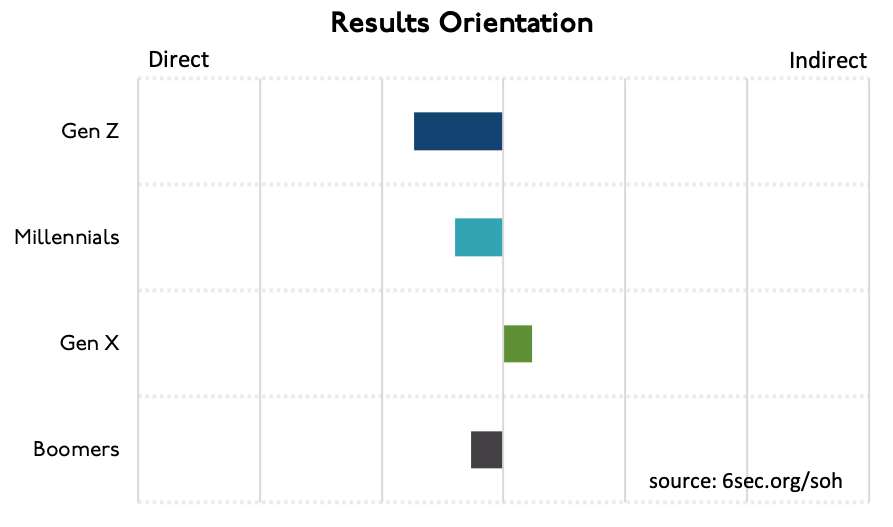Emotional Intelligence Gaps Across the Generations
New global study reveals striking contrasts between generations, including serious threats to GenZ and concerning questions about the Boomer generation.
by Joshua Freedman
Emotional intelligence is the ability to accurately acquire data from feelings and to effectively use that data to solve problems. In other words, it’s being smarter with feelings — an essential skillset for building healthy relationships & teams, negotiating, and leading self & others. EQ, or emotional quotient, is the measure of emotional intelligence. Overall EQ declined sharply in 2020, but that’s just the tip of the iceberg.
In a diverse and changing world where people of all ages need to find new ways to work together, there’s great value in going “below the tip of the iceberg” toward deeper understanding. While some aspects of generational difference might be simply due to age, the pandemic offers a unique lens to see how generational differences can form. These insights into generational patterns and differences can help us improve our empathy, collaboration and communication.
State of the Heart is the world’s largest study of emotional intelligence; it began in 2011. Using a random sampling from 129 countries, the study is the global benchmark for EQ. The 2021 State of the Heart Report goes in depth on generational differences; here are three of the key findings:
1. Generation Dread – Volatility for GenZ
In her new book & newsletter on staying sane in an era of existential threat, Britt Wray describes GenZ as “generation dread.” Faced with the trauma of coming of age in a world where the future is profoundly uncertain, Wray offers science that mental health and climate health are inexorably linked. As Dr. Wray puts it, “The future of life on Earth demands that we upgrade our emotional intelligence.” While this may be dramatic, study after study is showing profound and dangerous emotional effects on people 10-24 years old.
One of the emotional intelligence competencies that dropped between 2019-2020 is called Navigate Emotions. It’s the ability to proactively engage with emotions as a source of insight and energy to help us move forward. People who have lower scores on Navigate Emotions are more likely to be volatile because they are overwhelmed by feelings.
All the generations faced a drop in this competency, but for GenZ the decline is precipitous (see graph to the right).
2. The “New Lost Generation” – Young People Feel Alone
The CIGNA loneliness studies show that people, in general, are feeling more lonely than ever — and that loneliness is a bellwether for diminished wellbeing and higher rates of brain illness. Other studies show that a sense of community — both close personal connections and broader social integration — are the top predictors of longevity.
While a vast majority of people experienced diminished wellbeing due to the pandemic, the State of the Heart data reveals that GenZ experienced a brutal disruption to their sense of community.
(see graph to the right)
3. Where Are the Leaders? Boomers In Retreat
Another concerning finding in the State of the Heart data relates to Baby Boomer leadership. We might expect that older generations have a larger sphere of concern and a social role of leading their families and communities. Therefore, Boomers would need both high levels of empathy and an orientation toward influencing others.
First, this graph shows people around 57-75 years old are more oriented toward self-awareness than toward empathy (see graph to the right)
Note: see page 15 of State of the Heart for explanation of these graphs
Second, this graph shows that in terms of effectiveness (one of the performance outcomes measured by the Six Seconds Emotional Intelligence test), Boomers are actually more oriented toward “do it myself” than “engage others”:
(see graph to the right)
This combination could lead to a self-centeredness and inhibit this generation’s ability to lead. In a time when the world urgently needs empathic leadership to engage and inspire others, it’s time to increase emotional intelligence.
Learn more about these findings as well as insights on gender and geographic differences in the full State of the Heart Report, which is freely available here.
- How Emotional Intelligence Coaches Use Emotions in Goal Setting - October 2, 2024
- 3 Winning Strategies for Successful Change Leadership: Coaching with Emotional Intelligence - September 4, 2024
- 3 Emotional Intelligence Tips for the Essence of Coaching - July 31, 2024





Joshua, thank you for this informative and invaluable information, this will definitely help me to articulate how self-regulation can help teams to bridge generational gaps.
Cheers!
Georgia
Please note that the Baby Boomers who are in positions of power are largely men….this needs to be considered more generally given that men are trained, and still are being so, to act and do rather than inform their decisions in a discerning way which takes account of their own heart response.
Josh – you continue to provide invaluable insight and encouragement. I am grateful for your generosity and your wisdom. i have no been working in EI for many years and it all started with you and then Dr Susan David who you connected me to.
Sincere thanks.